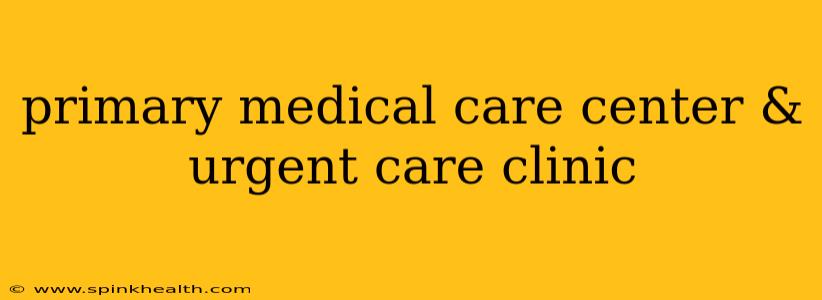Primary Medical Care Center vs. Urgent Care Clinic: Knowing When to Go Where
The world of healthcare can feel like a maze, especially when you're faced with a sudden illness or injury. Do you head to your primary care physician, or is urgent care the better option? Understanding the key differences between a primary medical care center and an urgent care clinic is crucial for navigating this maze efficiently and effectively. This isn't just about convenience; it's about getting the right level of care at the right time.
Imagine this: It's a Tuesday evening, and you wake up with a throbbing headache and a fever. Panic sets in. Do you call your doctor, who might not be available until next week, or do you head to the nearest urgent care? This scenario highlights the core difference: primary care focuses on preventative and ongoing health management, while urgent care addresses immediate, non-life-threatening health concerns.
Let's delve deeper into the specifics, answering some common questions that often arise when choosing between these two vital healthcare settings.
What is a Primary Medical Care Center?
A primary medical care center, or family doctor's office, is the cornerstone of your long-term health. Think of it as your health headquarters. Here, you'll build a relationship with a physician who knows your medical history, family history, and overall health profile intimately. Your primary care physician (PCP) is your go-to for:
- Preventative care: Annual checkups, vaccinations, screenings (like cholesterol and blood pressure checks), and health counseling. Your PCP helps you stay healthy before illness strikes.
- Ongoing management of chronic conditions: If you have diabetes, hypertension, or asthma, your PCP provides ongoing care and monitoring, adjusting medication and treatment plans as needed.
- Referral to specialists: Your PCP acts as the gatekeeper to specialized medical care. If you need a cardiologist or dermatologist, your PCP will provide a referral.
- Diagnosis and treatment of minor illnesses: While not equipped to handle emergencies, a primary care center can often diagnose and treat common ailments like colds, flu, and minor infections.
What is an Urgent Care Clinic?
Urgent care clinics are designed to handle non-life-threatening medical issues that require immediate attention but aren't severe enough for the emergency room. Think of them as a bridge between your PCP and the hospital's emergency department. Urgent care is appropriate for:
- Minor injuries: Sprains, strains, cuts requiring stitches (often), and minor burns.
- Sudden illnesses: Flu-like symptoms, strep throat, ear infections, bronchitis (often), and urinary tract infections.
- Acute exacerbations of chronic conditions: If your asthma suddenly worsens or your diabetes requires immediate attention outside of your scheduled appointment with your PCP, urgent care can provide immediate relief.
When Should I Go to Urgent Care Instead of My Primary Care Physician?
Urgent care is ideal when you need immediate medical attention but don't require emergency services. Consider urgent care if:
- Your PCP is unavailable: They might be out of the office, or their appointment slots are full.
- You need immediate attention for a non-life-threatening issue: A sudden onset of illness or injury that requires prompt evaluation and treatment.
- Your condition requires immediate, but not emergency, care: A high fever, severe cough, or significant pain warrant urgent care.
When Should I Go to the Emergency Room Instead of Urgent Care?
The emergency room (ER) is reserved for life-threatening conditions. Go to the ER if you experience:
- Severe chest pain or shortness of breath.
- Severe bleeding or trauma.
- Loss of consciousness.
- Severe allergic reactions.
- Signs of a stroke or heart attack.
How Much Does Urgent Care Cost Compared to a Primary Care Visit?
The cost of urgent care can vary significantly depending on your insurance coverage, the specific services you receive, and the location of the clinic. Generally, urgent care visits are more expensive than routine primary care appointments, but often less expensive than a visit to the emergency room. Always check with your insurance provider to understand your coverage and cost-sharing responsibilities.
Does Urgent Care Take My Insurance?
Most urgent care clinics accept a wide range of insurance plans. However, it's always best to verify your insurance coverage with the clinic before your visit to avoid unexpected bills. Be sure to bring your insurance card with you.
In essence, your primary care physician is your long-term healthcare partner, while urgent care provides timely assistance for immediate, non-life-threatening issues. Understanding the difference empowers you to make informed decisions about your healthcare, ensuring you receive the most appropriate and timely medical attention.

